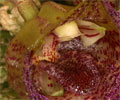|
|
|
|
|
| |
Flasks of
Masdevallia angulata 'Cloud Ridge' -spontaneous |
|
| |
|
|
| |
| Number: |
TN2740 |
| Name: |
Masdevallia angulata 'Cloud Ridge' -spontaneous
|
| Type: |
spontaneous (What's that?) |
|
Seed Donor: |
Marius S. Wasbauer
(Email: mwasb@600amps.com)
|
|
Click to Enlarge

Pod Parent Flower |
Click to Enlarge

Pod Parent Blooming Plant and Buds |
Click to Enlarge

Offspring 'MC4522' Flowers |
Click to Enlarge

Offspring 'MC4522' Closeup of Flower |
| Offspring photos are siblings of the plants you would receive. |
|
|
|
| |
Culture Notes from Donor: Parent plant: Minimum night temperature, winter and summer, 48°F. Maximum temperature (summer) less than 80°F. However, it grew in Sacramento under intermediate conditions and bloomed every year.
Comments: An undemanding species.
Parent plant: Medium sized plant.
For additional origin/habitat information supplied courtesy of
Charles and Margaret Baker, see further below, near the bottom of this page.
|
Temperatures we attempt to use in the lab & greenhouse:
| For Species: |
|
Spring, Summer, Autumn, Winter: days average 79°F, nights 55°F; best fit is Cool-Intermediate 75-58°F
(Source:
Baker's Web OSC) |
|
About the name...
| Etymology of |
angulata |
|
From Latin "angulatus" with angles, sharp corners.
(Source:
Mayr & Schmucker 1998) |
| Etymology of |
Masdevallia |
|
Named for José Masdeval, physician in the court of Spain.
(Source:
Pridgeon 1992) |
| Pronunciation of |
Masdevallia |
|
maz-de-VAH-lee-ah
(Source:
Hawkes 1978) |
|
If you would like to direct someone to this web page, please copy and paste this URL into your email:
http://troymeyers.com/d?012740
| Flask Information |
| Availability: |
There were problems with this item and we weren't able to make any viable flasks. |
| You should: |
Consider placing a "Notify Retries" Request, and if an identical pollination (the same parents) is done again, we'll let you know. |
|
You might also want to:
|
View the seed assay for this item.
View items of the same species.
View items of the same genus.
|
|
|
| |
The origin/habitat information below is supplied courtesy of Charles and Margaret Baker
The following information is based on the name of the plant provided by the donor, and assumes that the name is correct. If the plant has been misidentified, then the following information may not be correct.
This text is copyrighted by the Bakers and may not be reproduced without permission.
ORIGIN/HABITAT: Colombia and Ecuador. This species is relatively common
and locally abundant in the cloudforests of Pichincha, Imbabura and Manabí
Provinces of northwestern Ecuador. In addition, plants have recently been
discovered in neighboring southern Colombia above Ricaurte in the
Department of Nariño. Plants are usually found at 4900-6900 ft. (1500-2100
m), but in Manabí Province in Ecuador, they have been reported growing as
low as 1950 ft. (600 m). Plants seem to grow equally well as epiphytes on
mossy trees in cloudforests or as terrestrials in shady humus or on dirt
road embankments. They may also occasionally be found growing on rocks.
More about this information and the Bakers...
|
|
|
| |
|
|
|